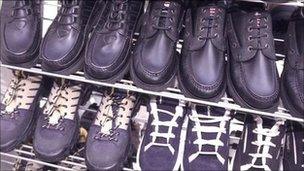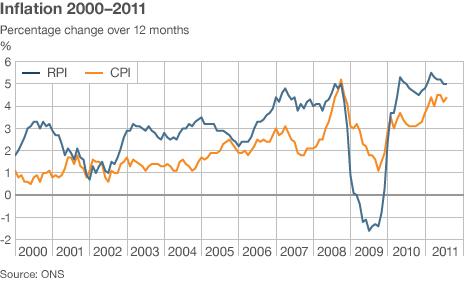UK CPI inflation rate rises to 4.4% in July
- Published

The clothing and footwear category was one of the major contributors to inflation
The UK government's targeted rate of inflation rose in July, following higher prices for clothing and footwear and fees for financial services.
The rate of Consumer Prices Index (CPI) inflation rose to 4.4% from 4.2% in June, according to figures from the Office for National Statistics (ONS).
The Retail Prices Index (RPI) measure was unchanged at 5%.
Clothing and footwear prices measured for CPI saw their biggest annual increase since records began in 1997.
Bank of England governor Mervyn King has written another letter to the chancellor, external to explain why CPI inflation remains well above the 2% target rate.
The governor must write a letter every three months if CPI is more than one percentage point above or below the target.
He blamed the continuing high inflation rate on, "the increase in the standard rate of VAT to 20%, and past increases in global energy prices and import prices".
He also stressed that "the big risks currently facing the UK economy come from the rest of the world".
The Bank of England said last week that it remained confident that inflation would return to its target level in the next two years.
Chancellor George Osborne replied, external to Mr King's letter saying that, "A crisis of confidence in the global economy demands a global response".
He called for credible cuts in countries with big deficits and a "rebalancing of global demand to support growth".
Rail fares
The ONS said the main contributors to inflation came from financial services, clothing and footwear, furniture, household equipment and housing rent.
It said one of the biggest contributions had come from fees for financial services, which rose in July but had fallen in the same month last year.
The main downward pressure on inflation came from food and non-alcoholic drinks.
"The big picture is still that rises in energy prices and in particular the VAT hike at the start of the year are still keeping inflation high," said Colin Ellis, chief economist at the British Private Equity and Venture Capital Association.
"At constant tax rates, CPI inflation was 2.8% in July."
July's inflation figures are particularly important because they are used to determine how much regulated rail fares can increase.
Under the government's new formula, fares will be able to rise by RPI+3%, which means average fares will be able to go up by 8% next year.
In other research, Kantar Worldpanel found that while grocery price inflation had grown 5.2% in the 12 weeks to 7 August, compared with the same period the previous year, grocery sales had only risen by 3.8%.
"It is evident that shoppers are trying to manage their 'personal' inflation by trading down," said Edward Garner from Kantar Worldpanel.
"It's therefore unsurprising that the discounters have pushed further ahead this month."
Aldi performed particularly strongly, taking its market share to 3.6% from 3% at the same time last year.
